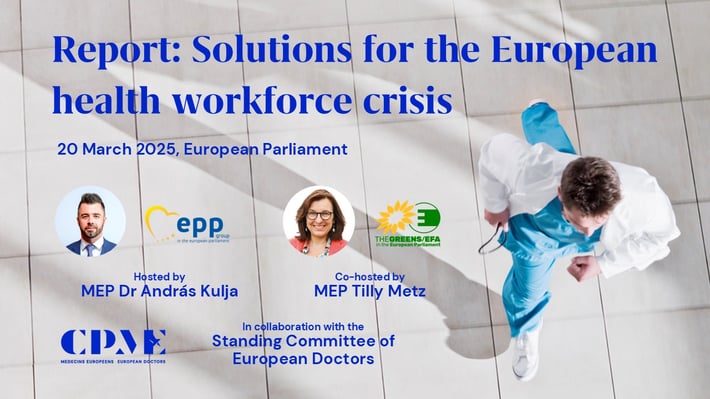Event report: Solutions for the European Health Workforce Crisis, European Parliament 20 March 2025

Doctors from over 30 countries gathered in the European Parliament to discuss sustainable solutions to the European health workforce crisis at an event hosted by MEP Dr András Kulja and MEP Tilly Metz, and moderated by Dr Andreas Botzlar.
Two panels discussed shortages of doctors and the working conditions of healthcare professionals. In this report, we share four take-home messages.
Dr Nikolay Branzalov (Bulgarian Medical Association) highlighted that Bulgaria is facing an ageing medical workforce combined with increasing emigration of healthcare professionals, which has created disparities in healthcare access and services.
Dr Milan Kubek (Czech Medical Chamber) added that there is a significant and widening gap between the availability of the healthcare in rural area and urban areas.
Panelists emphasised that this crisis is not limited to one region—almost every European country is experiencing staff shortages. Even wealthier countries are struggling to recruit and retain enough health professionals. The shortages are interconnected, and a fragmented response will not solve them.
Dr Kitty Mohan (British Medical Association) emphasised that doctors are struggling with overwhelming workloads, poor IT systems, decreased job satisfaction, and decades of underfunding, leading to deep dissatisfaction.
In addition, Dr Philippe Cathala (French Medical Council) reported that nearly one in two doctors faces some form of aggression each year. Prof. Dr Bojana Beović (Medical Chamber of Slovenia) shared that Slovenian doctors have been on strike since January 2024 due to excessive working hours.
Participants warned that we need to take action or the crisis will deepen. Solutions include ensuring compliance with the EU Working Time Directive. It was also highlighted that high-quality postgraduate training programs are essential for retaining medical professionals.
Dr Martin Balzan (Medical Association of Malta) urged for more standardised data across Europe, not only on numbers of doctors but on full-time equivalents. This would identify variables, such as whether doctors are working part-time or double time.
Dr Ina Kelly (Irish Medical Organisation) stressed that we need comparative figures to learn from each other, and to understand our health systems to interpret it correctly.
This high-quality data is crucial to diagnose issues in our healthcare system and address workforce planning
Panelists warned that as long as Europe continues to lack high-quality, comparable data, we cannot plan, coordinate, or fix the health workforce crisis effectively.
CPME President Dr Ole Johan Bakke concluded the event by noting that the stories of doctors across Europe illustrates a health workforce on the brink. He emphasisied that investing in the health workforce is an investment in the resilience and prosperity of our societies.
Retaining our doctors and other healthcare professionals is not only vital for public health but also for ensuring that Europe remains prepared and resilient in the face of crises.
Healthcare professionals are the backbone of the entire healthcare system. Without them, there is no care delivery, no patient care, and no universal health coverage. European coordination is needed to ensure that EU countries are self-sufficient in training a highly educated healthcare workforce to meet their needs.
The workforce crisis is a shared European challenge that no country can address alone. Addressing this crisis requires a coordinated effort across policy areas.
CPME is calling for an EU Health Workforce Strategy to ensure that this issue is given the attention it deserves at the European level.
We are committed to working together with the European institutions to ensure that we rescue our health workforce back from the brink.
“We should act now. The joint report on the healthcare workforce from the European Parliament should urge the Commission to take immediate measures and establish a long-term strategy to tackle the workforce shortages across Europe.
We have a common aim to provide accessible and affordable healthcare for all EU citizens with sustainable workforce management. Yes, it is a member state competence, but I think now we all realise that we also have to work together to find the proper solutions.
The COVID-19 pandemic showed us that we can make better decisions and find better solutions together. That is why we have the European Health Data Space and a Critical Medicine Act, because the EU realised that that we face similar problems in every member state.
It is crucial to find solutions for workforce shortages to secure the health security of patients. Without doctors, we cannot give the necessary therapy to patients. Healthcare systems have not managed to recover fully from the pandemic, leaving postponed interventions, lengthened waiting lists and exhausted nurses and doctors."
“The health workforce cannot continue like this. There are challenges that are best addressed at the European level, there are even challenges that can only be resolved at European level. We need more cooperation and not more competition.
As European politicians, we cannot just stand by and watch this continue. It is time for bold and decisive action. During the pandemic, if we would have only stuck to our official competence, we would not have had vaccination for the 27 countries.
We need better working conditions, fair pay and continuous training. We also need to reinforce the social dialogue with the healthcare professionals we need to promote collective bargaining and really ensure that their voices are heard.
We need also legislation that supports the working conditions. It is essential to develop directives targeting the psychosocial risk and muscular skeletal disorders also key drivers also of the burnout and staff shortages.
We must explore the creation of a directive on safe staffing, ensuring adequate personal levels for both patient care and staff well-being and mental health."